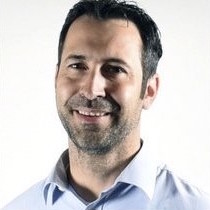
Darrell Wildt
October 30, 2014
On this date we featured Darrell Wildt, Social studies and Mathematics teacher at one.Lodi, a program of the San Joaquin County Office of Education in Stockton.
Darrell has the unique distinction of teaching both math and history, and his deep understanding of and appreciation for both subjects has allowed him to help his students understand the relevance of and the connections between these two seemingly disparate subjects. Meanwhile, Darrell’s knack for blending curricula in this way has led to a passion for and commitment to teaching integrated courses.
Darrell said his original goal was to teach at the college level, but while working as a Probation Assistant for San Joaquin County and the county’s office of education (SJCOE), he discovered the power education had to transform the lives of the individuals with whom he was working. Through his support work with SJCOE schools, Darrell saw a need he felt he could fill. “I had a lot of course development ideas that I saw missing in the school program, and I thought about ways I could help fill those gaps. And I realized that if I could help empower students, and help reveal their own genuine ability to do things for themselves, then that’s what I wanted to do with my life.”
His ideas of how curriculum could be shaped to be more engaging and relevant for students began in his role filling in as a math teacher at one.Lodi. Because Darrell teaches in an Alternative Education setting, he was able to teach math before being fully credentialed. A natural aptitude and self-described “geeky interest” in the subject made him a good fit for teaching it to his students; and his supervisors helped Darrell further develop as a math teacher: “They referred me to professional development in math whenever it was offered.”
Eventually, Darrell wanted more formal training in teaching math, so he went through the California Verification Process for Special Settings. “At the time, no one was requiring it for my teaching because I was still teaching history, government, or economics for the bulk of my courses, but I felt compelled to get the verification because I wanted to teach cross-curricular projects on a more regular basis and in a robust way.”
Darrell has used his knack for blending curriculum in a variety of interesting ways. A personal highlight for him was the summer he spent teaching economics, incorporating algebra and geometry into the mix. “During that specific summer course, students studied the industrial revolution, textile miles, and natural resources such as cotton. We also studied economic systems, macro and micro economics, and sole proprietorships. And during the entire process the students used algebraic equations and inequalities to schedule production and worker hours, make decisions about ordering materials, assign wages and advertise goods.” In addition to using algebraic principles to make these decisions, students “applied geometry when they designed their factories and organized and placed their machinery, and when they designed the products being created by the factory. The class was intense for students, but it was also fun.”
Darrell’s propensity for working with curriculum that will engage students just as much as it will challenge them led him to his first experience with UCCI, as a course designer at the Fall 2010 UCCI Institute. At the Institute, Darrell was part of the team that created Journey for Justice in America: American Government & Public Services, a course integrating government with the content and skills of the Legal Practices CTE Pathway of the Public Services CTE Industry Sector. He began teaching the course shortly after it was approved by UC. In 2012, Darrell applied for and received a UCCI Pathways Grant, which he used to develop three courses integrating History / social science (A) with the Design, Visual, and Media Arts CTE Pathway of the Arts, Media, and Entertainment CTE Industry Sector.
From there, Darrell went on to become a valued contributor to UCCI, serving again as a course designer and later as a facilitator to teams at multiple UCCI Institutes. His enthusiasm for integrated curriculum and his genuine interest in working with people have contributed to Darrell's ability to help the UCCI teams he has led develop courses that earn A-G approval, such as U.S. History and Public Health and English 9 Reading, Writing and Research in Social Entrepreneurship.
Though Darrell’s early work as a teacher involved blending the academic subjects of history, social science and math, he has come to see great value in the integration of academic subjects with the content and skills of specific CTE sectors. Darrell feels this kind of integration “makes students think about the world beyond high school sooner.” But these kinds of courses, Darrell says, have benefits for teachers as well. “When you’re teaching an integrated course, the real world application becomes easier to teach. It becomes much easier to answer the ultimate question most students ask which is ’Why are we learning this?’ The projects are inherently relevant and engaging to them.”
“Integrated curriculum offers students two paths to consider for themselves,” Darrell said. “One path is for students that are interested in a particular pathway—and once they take the course, they get a taste of that pathway at the same time that they fulfilled a requirement for UC/CSU freshman admission. It’s a win-win. They get the benefit of the experience for both college and career preparation.”
